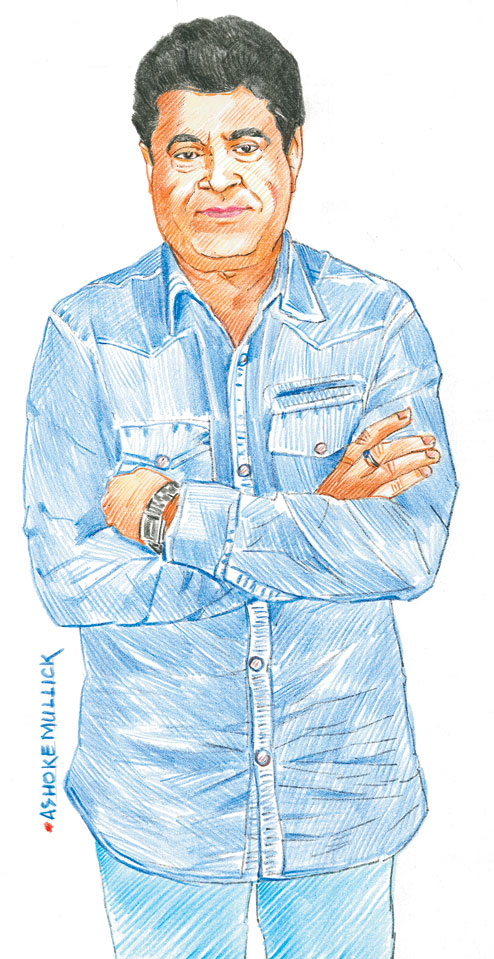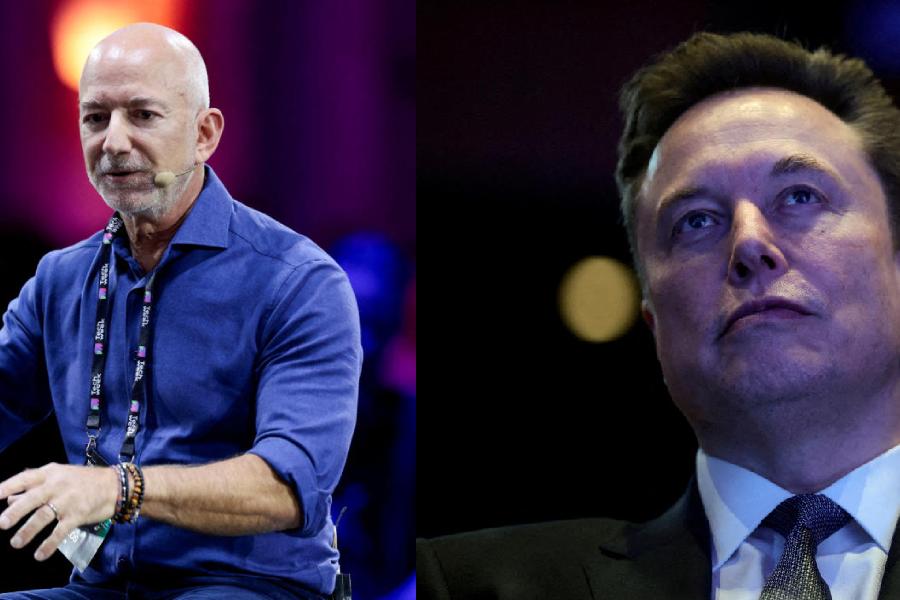
This is sheer madness," Gajendra Chauhan says. Some 25 journalists, he adds, are waiting for him outside his house in Mumbai, even though he is several hundred kilometres away. His phone has been ringing non-stop. The new chairman of the Film and Television Institute of India (FTII), Pune, shakes his head in disbelief.
If you are in the eye of a storm, there has to be a gale around you. FTII students are on a dharna, demanding that Chauhan be removed from the institute, whose earlier heads have included such luminaries as Shyam Benegal, U.R. Ananthamurthy and Girish Karnad. "Go back, Chauhan, Ghatak was here," says a poster that the students have been waving.
Their grouse is that Chauhan doesn't have an oeuvre worth writing home about. They point out that his claim to fame is that he played the role of Yudhishthir in the television series Mahabharat. But Chauhan, who joined the Bharatiya Janata Party (BJP) in 2004, is not fazed by the criticisms.
"Tell me something," he asks earnestly. "Is everyone with the Board of Control for Cricket in India a cricketer? Also, the ones who are there, are they all top-rated players?"
Someone who is a great actor or a director, he argues, is not necessarily a great administrator. "What use is having an excellent artiste at the top who is unable to do anything for the institute," he argues.
Why then are the students protesting?
"Whenever something good happens, there will be objections," he replies. "There will be protests because no one wants an ordinary man to occupy a big position. Our country has this mindset that not everyone can aspire for a big post. But the mindset of the BJP isn't like that. Even a chaiwala can become the prime minister."
By now a small crowd has gathered around us. We are sitting on the lawns of the BJP headquarters in New Delhi, and visitors and workers have spotted the actor. The media have been waiting for him, too - television crews are biding their time. A would-be poet presents him with his book and wants to take a photograph with him.
In the midst of all this, Chauhan plays a gracious host, offering tea and apologising for the endless phone calls that keep interrupting our conversation. He decides it is best to switch off the beast. "Else, I may just not be able to finish this interview ever," he laughs.
Chauhan stresses that he is being targeted by political opponents. "Students are gullible. This protest looks politically motivated," he says.
Protests, of course, are not new to FTII. And the students, usually, win the battles. In 2010, they opposed the government's move to remodel the institution on the lines of a private-public partnership. The proposal was eventually shot down. Students went on a long strike in 2001-02, when the institute's then director, actor Mohan Agashe, tried to restructure the course. Agashe finally resigned. Much before that, FTII students - with Naseeruddin Shah on the forefront - were on a protracted strike over changes in the curriculum.
The outrage this time, I point out, is based on fears that Chauhan - who campaigned extensively for the BJP in the last few elections - would foist the party's "Hindutva ideology" on the students.
"I believe my ideology would be limited to myself and not forced upon anyone," says the 58-year-old, looking fairly natty in a pair of blue denims, a matching shirt and brown leather shoes. "I promise my ideology will be out of the gates of the FTII. I belong to the BJP and my ideology originates from there. But inside the gates of the FTII, it will only be about cinema," he adds.
Cinema, clearly, is his raison d'être. Born into a middle-class family in Shadi Khampur, an urban village in west Delhi, Chauhan actually trained to be a radiologist. The youngest of four brothers, he worked with the All India Institute of Medical Sciences (Aiims) for over two years before deciding to leave the comforts of a cushy government job for an acting career. Acting had always interested him - especially after he participated in plays in school and college.
"I felt stifled at Aiims as there wasn't any creativity involved in my job," he recalls. He left Delhi and joined an acting school in Mumbai, working part-time to keep body and soul together. Once the course was over, he took up every offer that came his way, including a 1989 film called Khuli Khidki described on many forums as a "hot" film.
Chauhan believes that his filmography shouldn't be the criteria to judge his eligibility for the post. What is important, he holds, is that his position in the party can help the institute and its students. "As I am an important member of the party, it will be easier for me to represent students in the information and broadcasting ministry," he says.
At the same time, Chauhan seeks to stress that he wasn't given this post purely because of his affiliation to the party.
"It is wrong to say so. There are at least 30 to 50 members associated with cinema in our party. Many of them may be more capable than I but the ministry chose me after much scrutiny. They must have seen my work in the party," says Chauhan, who was the BJP's national convener, culture, and also in the national executive committee for two terms as a special invitee.
He adds that he was called for three meetings with the advisory committee in the ministry until the appointment came through after an interview. "Also, it is no reward by the party. Rather, I would say that the post for me was long overdue."
Chauhan - whose wife, Habiba Rehman, is a choreographer in Bollywood and son, a doctor - has acted in over 600 serials and 150 films in his 34-year-long career. But the roles, barring the one in Mahabharat, have not been substantial.
"I may not be a great actor. But I understand cinema," he replies. "During those days it wasn't easy surviving in the film industry without a godfather. But I took it up as a challenge and signed up whatever came my way," he adds. The first break came with Rajshri Productions' television series Paying Guest in 1983, and he went on to act in shows such as Rajni, Air Hostess and Adalat.
Then, of course, there was Mahabharat, B.R. Chopra's mega series aired from 1988 to 1990 on Doordarshan. Chauhan was initially signed up for Krishna's role in the soap. "After audition it took four years for the serial to start shooting. Meanwhile I had signed some Malayalam films and put on weight. When I came back from the South, I was refused the role of Krishna because of the added weight. But, as destiny would have it, I got Yudhishthir's role. So I have no regrets," he laughs.
But can a man known mostly for his role as a character in a mythological epic handle a 55-year-old national institute that has produced some of the best talents of the Indian film industry? Chauhan replies that he has a great many plans in mind. But, first, the problems have to be dealt with.
"Last year's audit wasn't tabled in Parliament and the batches that started in 2008-09 are still there. Why should a three-year-course drag on for seven years? Students need to graduate, earn their living and fulfill their dreams," he says.
I refer to reports about some new members of the FTII - affiliated to the Sangh Parivar - seeking to inject a dose of nationalism into the institute and its students.
"Who exactly is a nationalist or what is nationalism? Why is it such a dreaded word? What is wrong in thinking about our own country? If some committee members are affiliated to the Rashtriya Swayamsevak Sangh then does that diminish their artistic credentials? These aren't issues that we should be worried about," he maintains.
The character artiste, who acted in films such as Baghban and Tumko Na Bhool Payenge, lists out his priorities: clearing the backlog of students, regularisation of admissions and upgrading the faculty.
"I will also get experienced senior artistes from the film industry to come and work as faculty at the FTII. Films made by our students will be sent to Doordarshan and the earnings will be given to the students. This will motivate them to do better work."
Chauhan believes that he will make a difference to the institute because of his "administrative qualities" and ability to handle tough situations. He cites his experience in the Cine and TV Artistes Association (Cintaa) as a case in point.
"I was the president of Cintaa last year and I started a service called Tatkal. Under it, if any producer didn't pay an artiste within 24 hours of shooting then they would stop working on their sets. It was so successful that we collected a backlog of Rs 2.7 crore in four months. We also implemented fixed hours of shooting, conveyance for junior artistes and rules for payment."
He adds that he is looking ahead. "I think you just have to do your work and forget about the rest."
We are done. Now Chauhan has to take a few selfies with the crowd waiting for him, sign an autograph book, meet the media and switch on his phone. And, yes, at some point of time, he has to meet the protesting FTII students.










